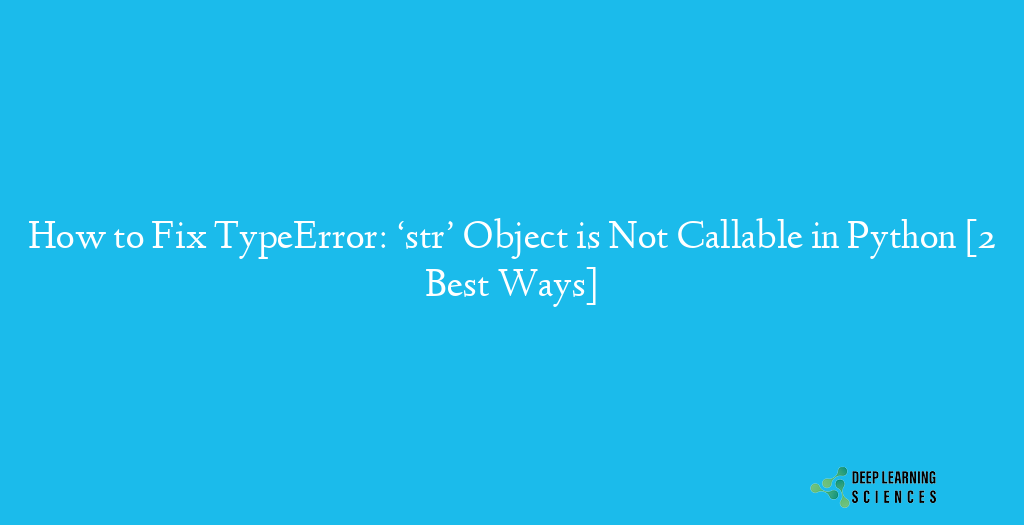Welcome to this article on fixing the TypeError: ‘str’ object is not callable. In this guide, we will explore the causes of this error and provide step-by-step solutions to resolve it.
A ‘str’ object refers to a string in Python. It is a sequence of characters enclosed within quotes (either single or double).
When you encounter the error message “‘str’ object is not callable,” it means that you are trying to use a string object as a function or method, but strings cannot be called like functions.

Causes Of The Error
There are two main causes of this error. They are:
Using a string as a function:
One common cause of this error is mistakenly using a string as a function or method. Python interprets the string as an object and expects it to be callable, leading to the TypeError.
Incorrect function call syntax:
Another cause is incorrect syntax when calling a function. It’s important to use the appropriate syntax to call a function, including parentheses and correct parameter passing.
How to Fix TypeError: ‘str’ Object is Not Callable
Check function names and variables:
First, double-check your code to ensure that you haven’t accidentally used a string as a function name or assigned a string to a variable that should hold a function.
Use proper function call syntax:
Ensure that you are using the correct syntax when calling functions. Functions should be called with parentheses after the function name, and any required arguments should be passed inside the parentheses.
Examples and Solutions
In this section, we will provide you with practical examples and step-by-step solutions to fix the “TypeError: ‘str’ object is not callable” error. By examining common scenarios where this error occurs, we will guide you through the process of identifying the issue and implementing the necessary corrections. Whether you encounter incorrect function calls or face conflicts between strings and functions, these examples and solutions will help you overcome the error and ensure smooth execution of your Python code. Let’s dive in and explore the practical ways to resolve this issue.
Example 1: Incorrect function call:
Here the incorrect function call.
my_function = "print"
my_function("Hello, World!")
Solution: Correcting the function call
To fix this error, you need to assign the actual function to the variable instead of a string representation of the function.
my_function = print
my_function("Hello, World!")
Example 2: Using a string as a function
In this example, the string is used as function which will led to error.
function_name = "my_function"
function_name()
Solution: Resolving the string conflict
In this case, the variable function_name contains a string instead of a callable function. To fix the error, assign the correct function to the variable.
def my_function():
# Function code here
function_name = my_function
function_name()
Best Practices To Avoid ‘str’ Object is Not Callable
To avoid encountering this error in the future, consider following these best practices:
- Be mindful of variable names:
Ensure that you use descriptive names for variables and avoid using names that conflict with built-in Python functions or data types. This helps prevent accidental string assignments to variables that should hold functions. - Double-check function calls:
Always review your code to confirm that you are calling functions correctly. Pay attention to the syntax, including parentheses and proper argument passing. - Test your code:
Regularly test your code as you write it to catch any errors early on. This allows you to identify and fix issues like the “TypeError: ‘str’ object is not callable” promptly. - Use type hints:
Utilize type hints in your code to explicitly specify the expected types of variables and function parameters. This helps you catch type-related errors, including incorrect function calls involving strings. - Review documentation and examples:
Consult the official Python documentation and relevant examples to deepen your understanding of how functions should be used and called correctly.
Conclusion
Fixing the “TypeError: ‘str’ object is not callable” error like other errors as list indices must be integers or slices, not str is crucial for ensuring the smooth execution of your Python code. By understanding the causes of this error and following the provided solutions and best practices, you can resolve the issue and write more robust and error-free code.
FAQs
Why am I getting the error message “‘str’ object is not callable”?
This error occurs when you try to use a string as a function or method, which is not allowed in Python. It usually happens due to incorrect function calls or mistakenly using a string instead of a function name.
How can I fix the “TypeError: ‘str’ object is not callable” error?
To fix the error, ensure that you’re not using a string as a function or method. Check your function names and variables to avoid conflicts with strings, and make sure you’re using the correct syntax when calling functions.
Are there any tools or linters available to help identify and prevent this error?
Yes, there are code linters and IDEs with built-in static analysis tools that can help you identify potential errors, including incorrect function calls. Examples include pylint, flake8, and PyCharm.